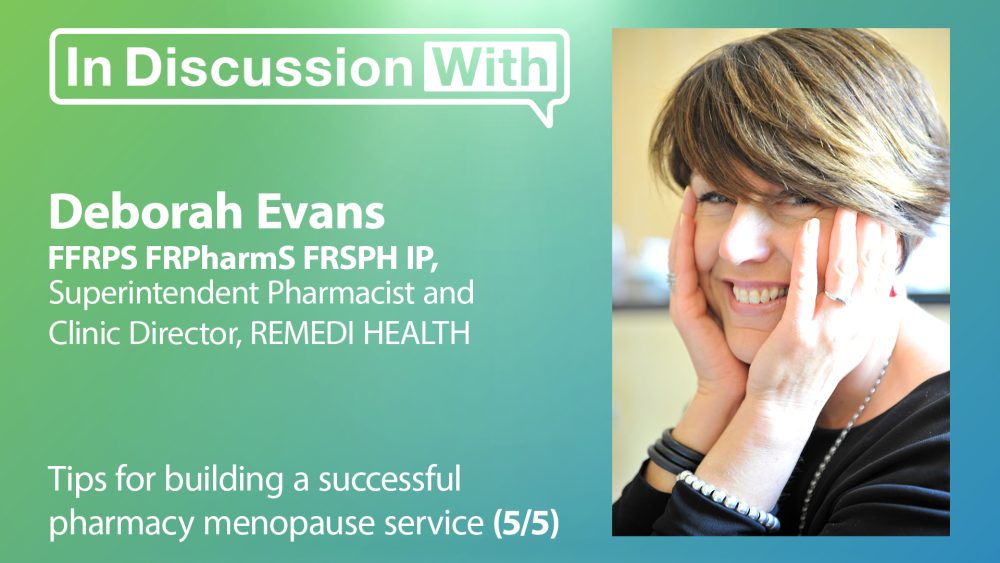Advertisment
Tips for building a successful pharmacy menopause service

Working in the menopause clinic is professionally rewarding and there is a wealth of resources available for keeping up-to-date. Awareness of the latest evidence and the ability to provide good quality, sound information is key to a successful service says Deborah Evans, prescribing pharmacist and Clinic Director at Remedi Health explains the details.
“I have never worked in a more rewarding area – it gives me immense pleasure to support women during this difficult time”, says Deborah Evans. She recalls that her own experiences of menopause and perimenopause were difficult – “ironically, I didn’t really know what was happening to me”, she says. Now she sees HRT as an important part of her care for her own personal health – probably for the rest of her life. Building on this experience she has established the menopause clinic at Remedi Health. The clinic deals with a wide range of women from diverse backgrounds. “What they have in common is the impact that this period of change and transition in their life is having on them – and that could be relationships with their children, with their family, with their spouses, their partners [or] it could be that they’ve lost their confidence at work”, she says. One case she remembers clearly was a barrister who had to give up her work because she could no longer perform satisfactorily in court – she kept losing the thread of what she was trying to say. She had to give up a previously thriving career as a result. “What we can do by listening to someone and helping her come to an informed choice about where she wants to go with her treatment is [to] support her in a way that means that she’s ….. empowered [and] she understands what she’s doing with her hormones. …… The changes two to three months on are phenomenal – and women are of course extremely grateful. ….. What I can see is the significant change in their overall health and well-being”, she says. “So, absolutely – the most enjoyable consultations to have – they just warm your heart – to help people in that way”, she adds.
If the patient’s problems are more complex or beyond Mrs Evans’ scope of practice then suitable avenues for referral exist. “At Remedi Health we pride ourselves on having a big network of tertiary care consultants that we can refer to if we need to. So, we’ll do our best to support a woman but if we feel that her problems are more complex, then we will of course refer on and this could be to an endocrinologist, [or] it could be to a gynaecologist …… ”, she explains.
Resources and training
For those who want to learn more about menopause management one source that Mrs Evans recommends is the health care professional resources from Newson Health, led by Dr Louise Newson. These provide up-to-date, evidence-based information. The British Menopause Society also has useful resources. Mrs Evans also suggests careful study of the NICE guidance – although the guidelines are currently being reviewed. The Primary Care Women’s Forum has good resources on the menopause and also the Faculty of Sexual and Reproductive Health. “We shouldn’t forget that many women in their perimenopause are still fertile and still can get pregnant ……so making sure that contraception is also a part of this picture is a really important part of the jigsaw”, she emphasises.
Tips for success
Mrs Evans recommends that colleagues should be menopause-aware whatever their area of interest or specialty practice. “If you’re seeing a woman in your consultation room and she’s suffering with mental health issues or a range of symptoms which are difficult to put in a normal [diagnostic] box”, she may be experiencing menopause symptoms. “From a healthcare professional point of view, I would say remember to look at women through that [menopause] lens”, she says.
For patients, Mrs Evans offers two tips – first, use a tracker app and second, do not forget that premature menopause also occurs.
Newson Health produces a Balance tracker app that can held on a mobile phone and is useful to monitor symptoms and follow progress over time.
If a young person is experiencing menopause symptoms she says “Don’t be put off by someone who might say to you, ‘you’re too young’ – because we’ve known people go through the menopause at 18 and younger. So, you wouldn’t say to somebody ‘you’re too young to get heart disease or type 2 diabetes’ – we just wouldn’t say that to somebody – we would look at the person in front of us and do our evaluation”.
Deborah Evans’ closing message to everyone is: “I think there are many myths out there about menopause and HRT – so make sure that you’re well-informed. That’s not just from the social media ….., it’s actually looking at making sure that the evidence that you’re looking at is good quality, sound evidence with the appropriate data behind it”.
About Deborah Evans
Deborah Evans is a pharmacist independent prescriber who specialises in women’s reproductive and sexual health, including the menopause. She owns and runs Remedi Health, a clinic in Winchester, Hampshire. She combines the roles of Clinic Director, Superintendent Pharmacist and hands-on practitioner.
Read and watch the full series on our website or on YouTube.
This episode of ‘In Discussion With’ is also on Spotify. Listen to the full podcast now.





